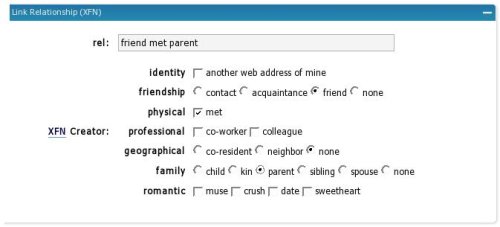Web Worker Daily covers the release of Google Social Graph API. These are pretty exciting news.
With so many websites to join, users must decide where to invest significant time in adding their same connections over and over. For developers, this means it is difficult to build successful web applications that hinge upon a critical mass of users for content and interaction. With the Social Graph API, developers can now utilize public connections their users have already created in other web services. It makes information about public connections between people easily available and useful.
Even better news are that one of the systems supported by Google is XFN – XHTML Friends Network. This is exactly the same XFN that you see mentioned in your WordPress administration. When you manage blogroll (links) of your site, you can attach different XFN attributes to each link. The screen looks something like this:

If your web site also uses one of the properly built WordPress themes, which has profile=”http://gmpg.org/xfn/11″ attribute set in the HEAD tag (see XFN join page for more information), then you are all set to go. Google will index XFN information from your site and will make it available via its Social Graph API.
It’s good to see Google stepping into this area. It brings a lot of public attention to a very useful area of our online lives. Soon, we’ll see more social tools and services like rubhub and Plaxo Pulse.